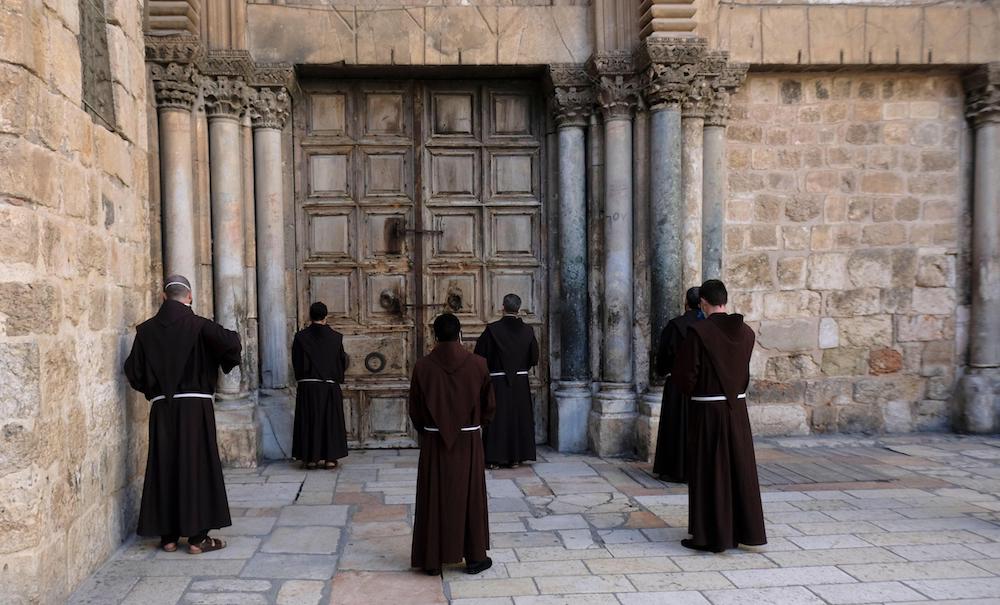News & Views
Poems for These Times: 3
(12 April 2020)
Before Majesty
by Czesław Miłosz

Our poem for this week is by the Polish poet, Czesław Miłosz (1911–2004), who directly experienced many of the violent upheavals of his time.
Before Majesty
It is bitter to praise God in misfortune,
thinking that He did not act, though He could
The angel of Jehovah did not touch the eyelids
of a man whose hand I hold,
I, a passive witness of this suffering for no cause.
Unanswered is our prayer, both his and mine.
Unanswered is my request: strike me
and in exchange give him an ordinary life.
A weak human mercy walks in the corridors of hospitals
and is like a half-thawed winter.
While I, who am I, a believer, dancing before the All-Holy?
For more on the life and work of Czesław Miłosz, click here.
Poems for These Times
‘Poems for These Times’ is a special collection of poetry offered in response to the Covid-19 pandemic. It is intended as a way of sustaining us, and to give us something on which to meditate together during these difficult and challenging times.
There will be just one poem each week, so that we can really stay with what is offered. We can read it – perhaps aloud – to ourselves or to any companions in our isolation, and sense the vibrations through our whole being. For poetry has the power to affect us on every level – body, mind, heart and soul. It has a magic, which, in the words of poet Adrienne Rich:
“… goes back very far: the rune; the chant; the incantation; the spell; the kenning; sacred words; the naming of the child; the plant, the insect, the ocean, the configuration of stars, the snow, the sensation in the body… The physical reality of the human voice.”
Of course, not every poem will appeal to everyone – that is inevitable. But there is also the possibility that staying with something that does not immediately appeal can be stimulating and helpful. Experience suggests that sustained attention and contemplation of a poem’s music, words and thoughts can be deeply rewarding.
It would be lovely to share any responses and thoughts you may have through our comments section below.
Barbara Vellacott
Sources (click to close)
Poem: Hymn o Perle ( Instytut Literacki, 1982) and New and Collected Poems 1931–2001 (Penguin, 2006).
Banner: Franciscan monks pray outside the door of the Church of the Holy Sepulchre in Jerusalem, The Church is believed to house two of the most sacred sites of the Christian tradition – the place of the crucifixion and the tomb where Jesus was buried and resurrected. It has been closed to visitors since 25 March 2020 due to the Covid-19 pandemic. Photograph: Eddie Gerald / Alamy Stock Photo
More News & Views
Don’t Take It Easy
Richard Gault is inspired by Michael Easter’s book The Comfort Crisis and explores the idea of ‘misogi’ during a 600-mile walk across Scotland
Book Review: ‘The Serviceberry’
Martha Cass contemplates the message of a new book by Robin Wall Kimmerer that advocates ‘an economy of gifts and abundance’
Book Review: ‘Conversations with Dostoevsky’
Andrew Watson engages with an innovative new book by George Pattison which explores Dostoevsky’s relevance in the contemporary world
Thich Nhat Hanh & the Poetry of Engaged Buddhism
Philip Brown presents the poem ‘Recommendation’ and comments on the potential of contemplative art to foster compassion
Introducing… ‘Perfect Days’ and ‘Nowhere Special’
Jane Clark watches two films with a contemplative theme
Book Review: ‘Irreducible: Consciousness, Life, Computers and Human Nature’
Richard Gault reviews a new book by Federico Faggin, one of the leading lights of the science of consciousness
FOLLOW AND LIKE US
——————————————
——————————————
——————————————
If you enjoyed reading this article
Please leave a comment below.
Please also consider making a donation to support the work of Beshara Magazine. The magazine relies entirely on voluntary support. Donations received through this website go towards editorial expenses, eg. image rights, travel expenses, and website maintenance and development costs.
READERS’ COMMENTS
3 Comments
Submit a Comment
FOLLOW AND LIKE US
A beautiful poem, and particularly on this day
Thank you for this poignant poem and for the image of Franciscan monks. I lived for many months in Assisi, the town of St Francis, and have never forgotten the spiritual feeling of the main square, the cathedral, St Francis’ hermitage and the cave where he did retreat. These places, and the people I remember there who were so very kind to me -and who must all be quite elderly now- have been very much in my mind and heart in these times of Covid 19.
Thank you for this. Today is Western Easter – next Sunday, Orthodox Easter. I’m happily stranded with a friend in my home and we’ll be using this for our next Good Friday, this coming Friday. Woe can be transformed.